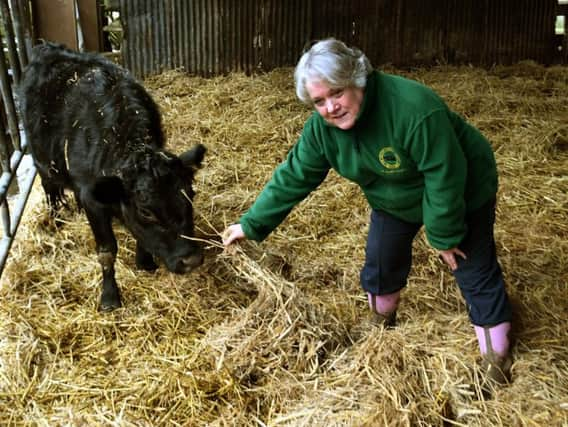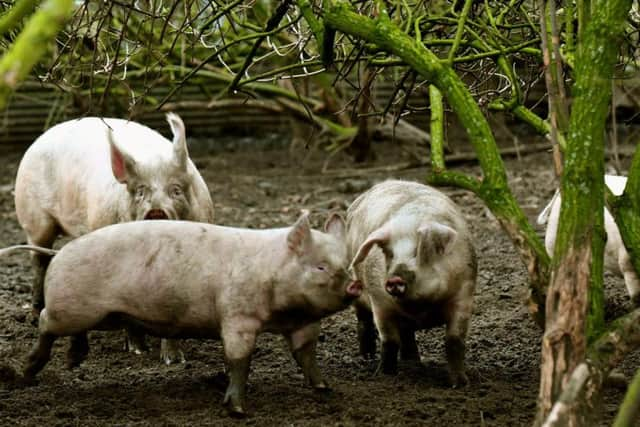Couple who 'fell into' farming are advocates of traditional breeds for better produce


Michael and Anne Leigh purchased Walbut House Farm in August 2003 and their farming life was born.
They hadn’t intended it to be so, but sixteen years later now attend food festivals, farmers’ markets and host their own pop-up butchers with pork, beef and chicken.
Advertisement
Hide AdAdvertisement
Hide AdThey hadn’t exactly come from a metropolis, they’d previously lived in North Duffield less than ten miles away, but had never farmed previously apart from Michael helping on his uncles’ farms in Ryedale many years previously as a teenager.


“We came here because we wanted the house and location,” says Anne. “The house came with land running to six and a half acres – and suddenly you think, this is more than half an acre, what are we going to do with it?
Billy is still flying the flag for Charolais after 50 years developing the Brampton herdCouple who sold their house and moved to a bare field to finance their rural dream“We were concerned over the provenance of what we were eating, so we started with a couple of Welsh Lop weaner pigs bought from the Lakins of Snainton near Scarborough. We’d found them through an advertisement in The Yorkshire Post.
“I hadn’t been sure about pork, as I’d gone off it at the time, but the pork these pigs created had such a great taste it convinced us that going for traditional breeds and bringing them on carefully was going to be worth doing.
Advertisement
Hide AdAdvertisement
Hide Ad“We tried a couple or maybe three Gloucester Old Spots next, again weaners, from the Lakins and then decided to get a Gloucester Old Spot gilt. We had chickens by this time, Crested Leg Bars, the blue egg layers; Rhode Island Reds and Barnevelders that all produced nice eggs.
“Around the same time we took on the gilt, we also took on a Large Black sow who had a litter of six,” says Michael. “Unfortunately, two days later she died and that led to another experience.
It must have been a Saturday night because we couldn’t get anything from our local agricultural supplier, so I asked Anne, who was at work at the time, to go to Boots on her way home and get some baby milk powder. We hand reared them over that weekend.”
It was Douglas the Dexter’s arrival in January 2004 that signalled the Leighs’ move into beef, they certainly hadn’t anticipated starting up a herd.
Advertisement
Hide AdAdvertisement
Hide Ad“Just before we arrived on another visit to Mr Lakin, for a couple more weaners, he phoned to say that, since he knew we were coming with our children, he wanted to warn us that a cow had just died and was in the yard. He didn’t want our boys to be upset.
“We loaded up our piglets,” says Michael. “And Anne asked Mrs Lakin what would happen to the calf that had been at foot of the cow that had died. Mrs Lakin had said something like it would have to ‘take its luck’.
“We set off home and I had Anne and the boys going on so much about the calf that we’d only gone about 175 yards down the road before I stopped, phoned the Lakins and offered to buy this young bull calf for fifty quid.”
It wasn’t long before Douglas was joined by a Dexter cow, Midget Gem, and the Leighs’ herd was under way. They are now protagonists for pure Dexter beef and have their own message they want to get across to consumers.
Advertisement
Hide AdAdvertisement
Hide Ad“We registered with the Dexter Cattle Society straight away and now have a herd of 25 suckler cows, a bull and followers. We now rent another 25-30 acres for grazing.
“Ours are the non-short Dexters as we are breeding for beef and we find they give a better carcase than the short-legged.
We calve in two batches in spring and autumn and take our beef animals to between 28-30 months. We sometimes sell the odd steer at a year old to people like us who want to have one or two because they have a bit of land.
“The Dexter society has a beef certification scheme that guarantees 100 per cent Dexter provenance, which we try to promote. When you see Dexter beef on a menu somewhere or in a shop and it is any more than 10-12oz sirloin steak we know that can’t be right because they are too small to produce that.
Advertisement
Hide AdAdvertisement
Hide Ad“What you are buying at that point is not pure Dexter beef but commercial Dexter X, making it only 50 per cent Dexter.
“Pure Dexter beef is a darker colour and is marbled all the way through, that’s why it has become very popular in recent years as it produces a juicier, sweeter tasting beef.”
Michael and Anne have changed their favoured pork breed to Middle White pigs. They currently have five Middle White breeding sows and two Gloucester Old Spots.
“Large Blacks proved too fatty for us, but the Middle Whites people say are perhaps the best of the traditional breeds.
Advertisement
Hide AdAdvertisement
Hide AdThey have a sweeter taste and the fat content is just right. They’re also not a big pig and provide reasonably sized chops and joints that are ideal for customers who don’t want something massive. We feed our pigs on barley and beans rather than commercially produced feed.”
Attendance at farmers’ markets started around three years ago at nearby Elvington. Sadly that has now finished, but it served as an introduction to others and their first food festival appearance in 2018.
“Elvington led to our now monthly stall at Selby, Easingwold and Wetherby farmers’ markets,” says Anne. “Our chicken reared for meat are all the British equivalent of the French Sasso slow growth, free range birds that, different to supermarket chicken that are ready at 35 days, we rear up to 80-90 days.”
For the past two years Michael and Anne have been attending Filey Food Festival. It was as a result of not going on one occasion that their latest idea was born.
Advertisement
Hide AdAdvertisement
Hide Ad“We’ve been to Filey several times now, but there was one day when the weather looked as though it was going to be awful, so we decided to try a pop-up farm shop in our farm building and it’s working very well.
Come along and see us. Our next one is Saturday, February 22.”